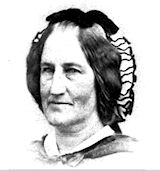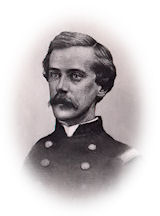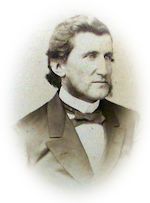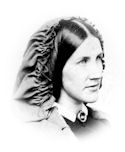 Mother to Georgeanna and Eliza in Alexandria.
Mother to Georgeanna and Eliza in Alexandria.
Ebbitt House,………………….
Monday Evening, April 15 or 16, 62.
Dear Girls: We have just had a call and salute from Joe’s manservant James, who wished to know if we had any “word for Mrs. Howland in the morning.” What with your three devoted “Mercuries” we seem to keep up a pretty constant intercourse, which is very cheering. . . . I was at my lonely tea this evening when suddenly I heard a sepulchral voice at my shoulder saying, “How is Miss Woolsey, Madam, this evening?” It was “me” young Augustus on his way out from the table behind me, where I had not noticed him. “You seem to be quite alone. I will be happy to take my breakfast with you, if you will permit me!” I was horrorstricken at the idea of having either of your chairs occupied by anyone to whom I should feel called upon to do the agreeable. . . .
I shall be very late unavoidably to-morrow, so that he will eat and go before I get down. This seems to be a favorite little attention with our gentlemen friends here— “taking breakfast with you!” . . . Only think of my missing another call from Mrs. McClellan and her mother. I had ventured out on a stroll by myself, to get my cap, which I didn’t get, and to bring Hatty a tumbler of ice cream, which I did get, and she enjoyed it very much with some fresh ladyfingers. This woman is not to be relied on, the cap was not done, and I shouldn’t wonder if she is taking the pattern instead of clear-starching it. I continued on to the avenue, bought Hatty a pair of gloves, looked in at one or two stores for something extremely pretty and cheap for a spring dress, but was not successful in finding it. The sun was very hot, and I was glad to get back again. . . . How in the world are you all accommodated in that small house? . . . So, after all, you mean to go, if you can, to Fortress Monroe. I am sorry for one thing—you will be so much more inaccessible to your family, almost beyond our reach, as only those belonging to the army will be permitted to go there. Nevertheless, I will make all the enquiries you name, and although my heart will break, will speed you on your way. Plague take this war! Hatty is better, but misses her other two nurses, and I do not believe has any confidence in my cooking; she acknowledges, however, grudgingly, that the beef-tea “tasted good,” and the arrowroot was excellent, though I saw her afterwards pouring in a double quantity of port wine, I having already seasoned it with sherry.

After Tea.
I have seen Mr._______ by particular desire in the parlor,—waylaid him, tied him down and pelted him with questions—as to the facilities, etc., of reaching Fortress Monroe at this present time. He gave no encouragement whatever as to your getting there; said he was quite sure that no passengers were allowed to that point and none on the Baltimore boat. . . . You had better not set your hearts upon such a plan. Would you not be quite as near, and hear as readily, in New York? We should be so glad to have you there with us. But I do not urge anything; all I can say is take care of yourselves, as you are very precious to your
Mother.
 Joe Howland to Eliza Woolsey Howland.
Joe Howland to Eliza Woolsey Howland.





